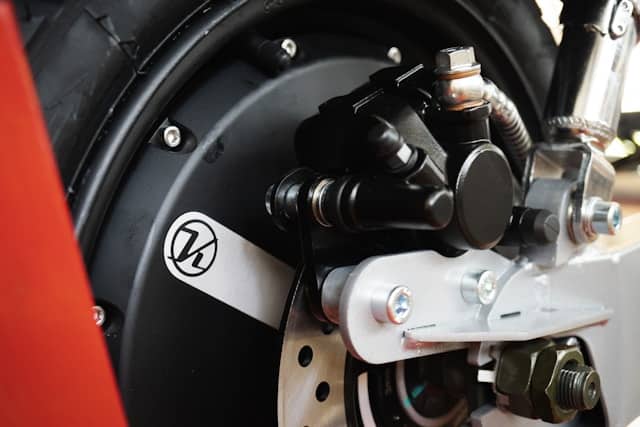When you put your foot on the brake pedal of a conventional car, the kinetic energy that was propelling your car forward gets converted into heat and goes literally up in smoke. However, in the case of hybrid cars, the introduction of regenerative braking has revolutionized this process, converting that kinetic energy into electrical energy that charges the car’s battery instead. This innovative technology not only improves fuel efficiency but could also potentially enhance brake system longevity. In the following sections, we will discuss the principles of regenerative braking, its implementation in hybrid cars, and its potential impact on brake system longevity.
Understanding Regenerative Braking and How It Works
Before we delve into the potential benefits of regenerative braking on brake system longevity, it is crucial to understand the working principles of regenerative brakes. Unlike conventional braking systems, regenerative braking doesn’t entirely rely on the friction between the brake pads and disc to slow down the vehicle. Instead, it captures and converts kinetic energy into usable energy.
Lire également : How to Effectively Reduce Road Noise in a Honda CR-V with Sound Deadening Materials?
When a driver applies the brakes in a vehicle equipped with a regenerative braking system, the electric motor goes into reverse mode. This action turns the motor into a generator and starts to produce electricity. The mechanical energy that was once wasted as heat in traditional braking systems now gets converted into electrical energy, which is then stored in the vehicle’s battery for later use.
This innovative technology is a win-win situation as it not only enhances energy efficiency but also potentially reduces the wear and tear on the brake pads, contributing to potentially longer brake system longevity.
Lire également : Louez une voiture de luxe à monaco
The Role of Regenerative Braking in Hybrid Cars
Regenerative braking is a key feature in hybrid cars, contributing significantly to their energy efficiency. Hybrid vehicles combine an internal combustion engine with an electric motor. The electric motor can act as a generator during braking or coasting, converting kinetic energy into electrical energy and storing it in the vehicle’s battery.
When the hybrid vehicle is in motion, the electric motor works in conjunction with the internal combustion engine to propel the vehicle, using the stored energy from the battery. This recovery and reuse of energy that would normally be lost in braking or coasting is what makes hybrid vehicles more fuel-efficient than their conventional counterparts.
Additionally, because the regenerative braking system reduces the reliance on the traditional friction brakes, it could potentially lead to less wear on the brake pads and discs, therefore enhancing brake system longevity.
How Regenerative Braking Could Enhance Brake System Longevity
The primary wear and tear on a conventional brake system come from the friction between the brake pads and the discs when the brakes are applied. This friction not only produces heat but also gradually wears down the brake pads and discs, reducing their effectiveness over time.
With the use of a regenerative braking system, the friction brakes are used less frequently, as the electric motor takes over most of the braking process. This lessened dependence on the friction brakes can lead to longer-lasting brake pads and discs.
Moreover, regenerative braking also reduces the load on the brake system during downhill drives. In a traditional car, continuous application of the brakes when going downhill can cause the brakes to overheat, reducing their effectiveness and contributing to faster wear. In a vehicle with regenerative braking, the downhill energy can be captured and converted into electricity, reducing the load on the brake system and potentially extending its lifespan.
Considerations and Limitations of Regenerative Braking
While the potential benefits of regenerative braking on brake system longevity are significant, it’s important not to overlook certain considerations. Firstly, the effectiveness of regenerative braking is closely related to driving conditions and driving style. For instance, if a driver frequently drives at high speeds and brakes abruptly, the regenerative braking system may not have enough time to capture a significant amount of energy, requiring the conventional brake system to take over.
Secondly, regenerative braking systems are complex and can be expensive to repair or replace if they fail. While the potential savings from a reduced need for brake pad and disc replacement may offset these costs over time, this would depend on specific driving conditions and habits.
Lastly, regenerative braking is most effective in stop-and-go city driving conditions. For drivers who primarily drive on highways or rural roads, where there are fewer opportunities to brake or coast, the benefits of regenerative braking may not be as noticeable.
In conclusion, while the adoption of regenerative braking in hybrid cars can potentially enhance brake system longevity, it’s crucial for potential hybrid car owners to consider their driving habits and regular driving conditions. Despite these considerations, there is no denying that regenerative braking is an innovative technology that is changing the face of the automotive industry, making our cars more energy-efficient and potentially extending the lifespan of the brake systems.
Regenerative Braking and Improved Fuel Efficiency
Regenerative braking plays a significant role in improving the fuel efficiency in hybrid cars. In a conventional vehicle, the energy that is lost during braking is one of the main reasons for low fuel efficiency. This energy, in the form of heat, is essentially wasted as it offers no benefits to the vehicle. However, a hybrid vehicle equipped with regenerative braking can capture this energy, convert it into electrical energy, and use it to charge the car’s battery.
This energy recovery process reduces the need for the internal combustion engine to run, leading to lower fuel consumption and improved fuel efficiency. Moreover, because regenerative braking reduces the reliance on the traditional friction brakes, it can potentially lead to less wear on the brake pads and discs, therefore further enhancing brake system longevity.
The regenerative braking system works best in stop-and-go traffic situations and during downhill drives. This is because these conditions provide the most opportunities for the system to recover energy. While the system’s effectiveness can vary depending on the driving conditions and the driver’s habits, the potential fuel efficiency benefits of regenerative braking are significant.
Conclusion: The Future of Brake Systems
The adoption of regenerative braking in hybrid cars could potentially revolutionize brake systems, leading to enhanced longevity. By converting kinetic energy into electrical energy, regenerative braking significantly reduces the wear and tear on brake pads and discs that is common in conventional braking systems.
However, it’s worth noting that the effectiveness of regenerative braking is closely related to driving conditions and driving style. This innovative technology is most effective in stop-and-go city driving conditions and during downhill drives. Drivers who frequently drive at high speeds and brake abruptly may not experience the same benefits.
Despite these limitations, the potential benefits of regenerative braking on brake system longevity are significant. As more and more vehicles are equipped with this technology, we can expect to see a decrease in the frequency of brake system replacements, leading to cost savings for vehicle owners and a reduction in environmental waste.
In conclusion, regenerative braking is an innovative technology that is changing the face of the automotive industry, making our cars more energy-efficient and potentially extending the lifespan of the brake systems. For potential hybrid car owners, it’s crucial to consider their driving habits and regular driving conditions to fully leverage the benefits of this system. The future of brake systems looks promising with regenerative braking leading the way.










